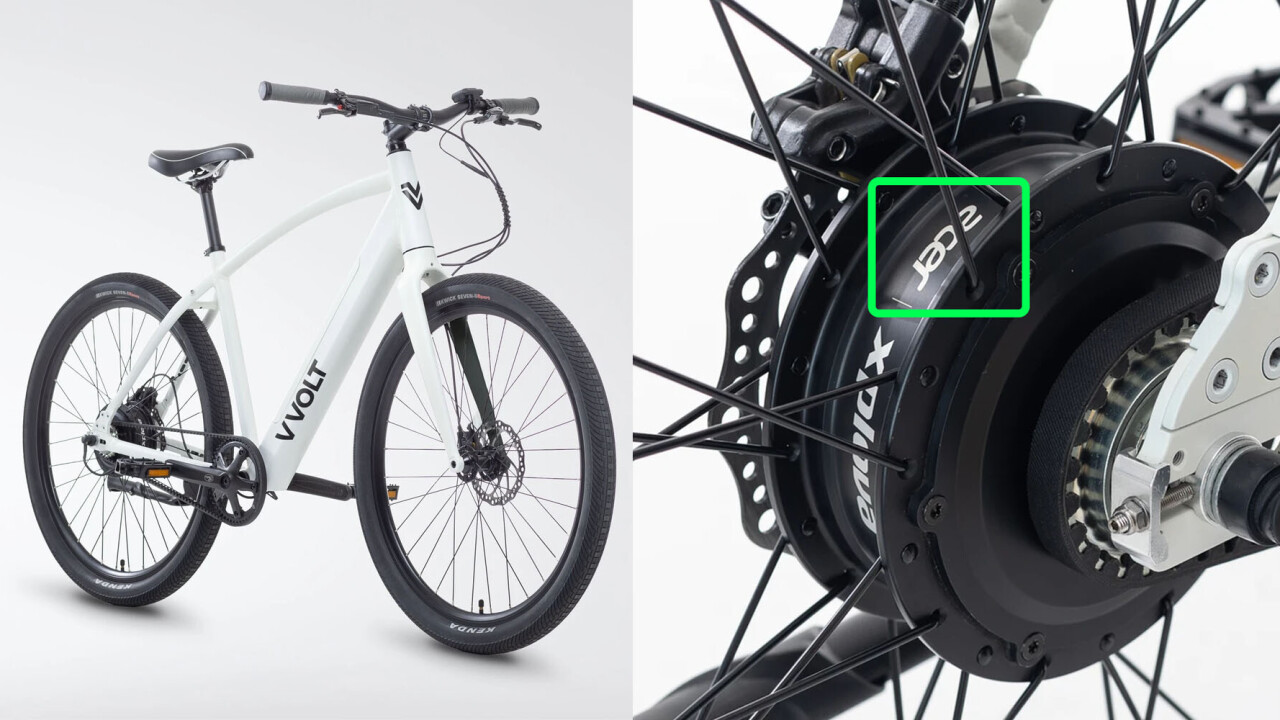Here at TNW, we’ve written a lot about ebikes and a lot about Acer, but not about any ebikes powered by Acer components. As it turns out, Acer recently began making motors via its cycling sub-brand Xplova, and a new ebike company named Vvolt will be the first to bring these motors to the US in two of its four launch models.
Acer partnership aside, Vvolt’s bikes look like welcome additions to the American ebike market. The company’s bikes are designed with reasonable prices and durability in mind — the bikes start at $1,399 and each use belt drives — without sacrificing ride quality. There are a number of sensible design choices. Even the frames are original designs too.
While I normally avoid writing about ebikes from new companies without having at least ridden a prototype, Vvolt is different in that it is one of the rare ebike startups not launching via a crowdfunding campaign.
The Portland, Oregon-based company has secured funding through more traditional means; it’s made up of many of the same folks behind cycling apparel company Showers Pass. The bikes are already in production and the company plans to start shipping bikes in late August. Notably, the company wants to prove it’s here to stay by offering a three-year warranty that includes the electronic components. Most ebike companies only offer a one-year warranty.
And they’re some pretty interesting bikes too.
On the more affordable end of the price spectrum are the Alpha and Alpha S models, the latter being the step-through variant that’s easier to get a leg over. Both modelscost $1,399 and offer a solid selection of specs, most notably the aforementioned 350W Acer/Xplova rear hub motor and Gates CDN belt drive.

The Gates belt drive is known for lasting several times longer than a chain, being virtually silent, making for a maintenance-free experience. The Alpha bikes are single speed models, as the motor means gears are less necessary for dealing with hills.
The bike also offers a 375Wh battery with LG cells that is removeable but sleekly integrated into the frame. It’s a more stealthy setup than most ebikes, and Vvolt claims the battery is good for up to 60 miles on a charge. The bike weighs 44-46 pounds depending on the frame size, and comes with 2-inch wide 650B (27.5″) tires that offer a bit more air volume and cushioning over traditional 700C tires.
Although the Alpha and Alpha S only use a cadence sensor (as opposed to a more advanced torque sensor), Vvolt tells me the Acer has tuned power delivery to be smooth using just the cadence information. The bike goes up to 20mph and offers 45 Nm of torque, by the way.
The bikes allow for five levels of pedal assist, which can be further tweaked via a Bluetooth app, and a USB port on the display can power the rechargeable lights. I’d much rather these lights be wired to directly to the controller, but at least they’re included.
Moving up the lineup are the Proxima ($2,599) and Sirius ($2,699), both of which use mid-drive motors, offer torque sensing, and come with step-less internally geared hubs. The main difference between them is that the Proxima offers a 100mm air-sprung suspension fork for handling rougher terrain.

Both models use a mid-drive motor by Taiwanese company MPF. This 250W (500W peak) motor offers up to 80 Nm of torque, which should be enough to help you climb any hill and — if the specs hold up — is comparable to motors from big names like Bosch and Yamaha. This motor is a torque-sensing design too, which will hopefully mean a more responsive ride.
The MPF motor is little known stateside but Vvolt says built up a reputation for reliability thanks to its steel, self-lubricating gears (you’d be surprised by the number of motors that use plastic components).

Speaking of gears, the Proxima and Sirius use the fancy Enviolo internally geared hub. As opposed to the traditional derailleur you’d find on most bikes, these gears don’t have ‘steps’ and you can shift whether you are pedaling, or stopped. They’re also known to be incredibly durable, needing only an oil change after several thousand miles. It also offers a wide 380% gear ratio.
The biggest difference between the two mid-drive bikes is that the Sirius offers an air-sprung 100mm suspension fork, and the Proxima is the only model in the lineup to use 700C tires. The Proxima weighs in at 50-52 pounds, while the Sirius weighs in at 54-56 pounds.

There’s a whole lot to like here. For the Alphas, at $1,399 you’d be hard-pressed to find another bike that has a Gates Carbon Belt, hydraulic disk brakes, and a 3-year warranty. The Ride1Up Roadster is a good deal lighter (35lb) and cheaper ($1,045), but uses a non-carbon belt and only offers mechanical rim brakes and a 1-year warranty. The battery is also smaller and not-removeable.
The mid-drive models are simply some of the most affordable mid-drive bikes I’ve seen. Let alone among those with a torque sensor, Gates Carbon Drive, and 80 Nm of torque.
The one asterisk to the price is that fenders and racks do not appear to be included, but the bikes do at least include mounting points for these. The batteries are also a little smaller than some other options on the market, but the bikes are also lighter and less conspicuous than most of the competition with larger batteries. Given the motors aren’t claiming ridiculous power specs, range should still be reasonable.
The company isn’t stopping with these four models either. It also teased a more futuristic-looking bike known as the ‘Bike V’ coming 2020, which will offer some extra functionality thanks to front and rear mounts for racks and baskets, integrated lighting (yay!) and the option of a second battery (which is a very good idea). A smaller 20-inch wheel up front helps stabilize cargo by lowering the center of gravity.

Further down the road, the company teased a cargo trike dubbed the Beluga, although Vvolt notes that it is currently a concept on the drawing board.

I wish more ebike companies (and tech companies in general) would launch this way. Crowdfunding has its place, but it too often leads to consumers getting burned. Of course, the proof is now in the pudding, which I’ll get to ‘taste’ when I test the bikes in the coming weeks. I’d advise waiting until there are third-party impressions of the bikes before spending your heard-earned money, but if the bikes caught your eye, the company is taking pre-orders with a $300 deposit over at Vvolt.com.
Get the TNW newsletter
Get the most important tech news in your inbox each week.




